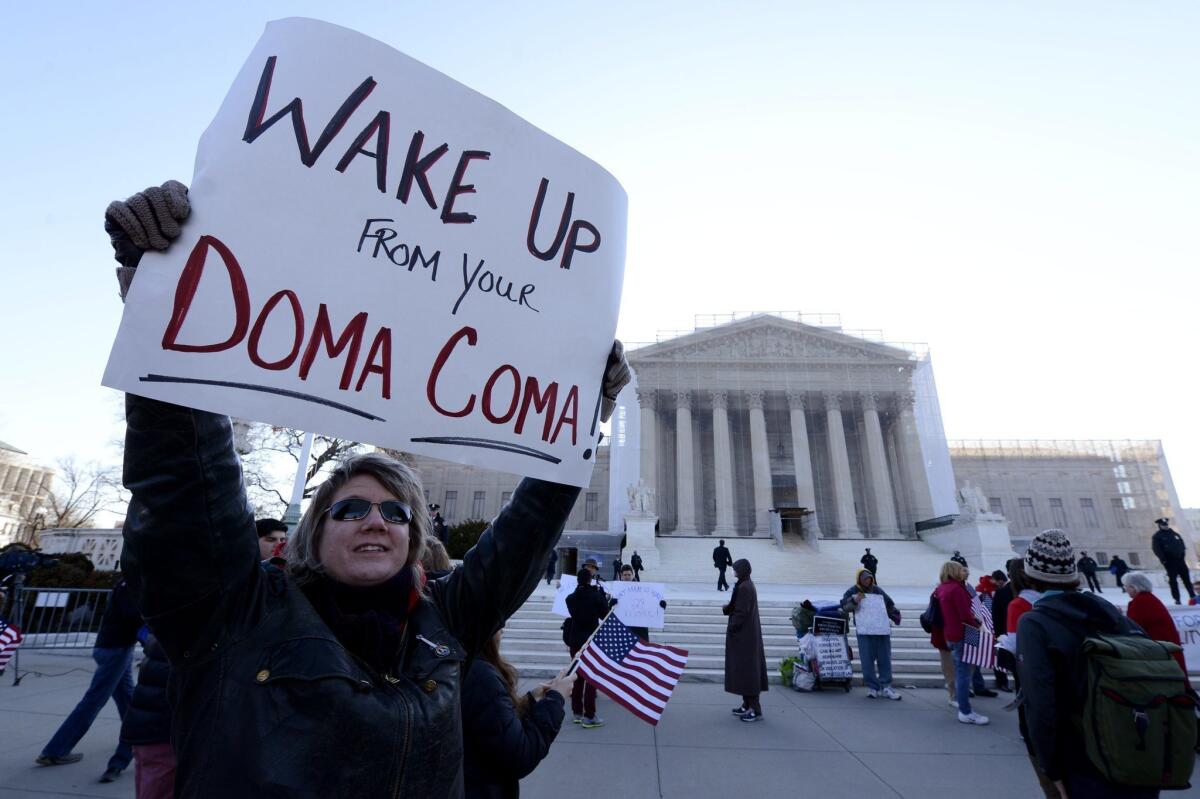For gay couples, marriage future hangs in the balance at court

- Share via
For the last decade, Tom Carpenter and his husband, Art Andrade, have taken every step forward – and back – in the changing landscape of rights for gay couples in California.
They are one of the estimated 18,000 gay married couples who are legally recognized by the state of California, but still not considered married in the eyes of the federal government.
As the Supreme Court takes up Proposition 8 and the federal Defense of Marriage Act this week, Carpenter is playing close attention to the latter, which would allow him and Andrade to share survivor’s benefits and other federal perks that straight couples enjoy.
“Our love is as valuable as anybody else’s love,” said Carpenter, an attorney, by phone. Carpenter, 65, and Andrade, 54, have been together for 20 years, and live in the Hollywood Hills. “We have the burdens and responsibilities, so we should get the benefits of our commitment to each other too.”
Carpenter says that as they get older, he’s particularly concerned that his Social Security benefits might not go to his husband. “I’m at the point now where I’m getting close to being eligible for Social Security,” he said. “That’s really disconcerting to me to think I’ve worked 40 years to get these benefits and that he would get nothing. That weighs pretty heavily on us.”
Carpenter says he has mixed feelings observing the two high-profile cases at the nation’s high court this week. “As a personal, tactical matter to me, DOMA has the greater effect.” But, he says, a victory for gay marriage in California would be welcome news. “I don’t think it would be empty, but it wouldn’t be complete” without recognition from the federal government, he says.
Carpenter is well acquainted with the ups and downs of gay rights in California over the last decade.
When Mayor Gavin Newsom first allowed marriage licenses to be issued to gay couples in 2004, he and Andrade were among the less than 4,000 couples to say “I do.”
Months later, when the California Supreme Court nullified their marriage, the couple wore matching T-shirts in West Hollywood; one read “Null,” the other, “Void.”
Marrying again in San Francisco in 2008 before Proposition 8 was passed, they were relieved when the state Supreme Court decided not to invalidate their wedding again.
“It was like a yo-yo. You were up and you were down.… We said, ‘We’ll just keep marrying until somebody says we finally got it right.’”
Newlyweds Jeff Aguero and Sebastian Tonkin are also anxious to hear the court’s decisions. When couples were hastily marrying in 2008 in anticipation of Proposition 8’s passage, the two had only been dating a few months. “We weren’t ready to get married then,” says Aguero, 27, who left Google last year to found a tech start-up.
They finally wed last June in a lakeside ceremony in Lake Tahoe. During the ceremony, a friend read an excerpt from Judge Vaughn Walker’s ruling that invalidated Proposition 8. Their union is not recognized as a marriage under state or federal law, but under California’s domestic partnership laws, they enjoy many of the same benefits married couples do.
But the Defense of Marriage Act has still cost them. Though they filed their first joint tax return in California this year, they still file separately to the IRS. And, Aguero says, if the federal government had recognized their marriage, the couple could have saved tens of thousands of dollars in taxes when Tonkin founded his tech company last year.
When they returned from their honeymoon in November, they went through immigration inspections separately. “It’s little things,” said Aguero. “All of our friends and family … think of us as married … and it’s been frustrating not having that recognition from society.”
And though they are young, Aguero says he worries about where his survivor’s benefits will go too. He became seriously ill two years ago, and thinks about what might happen if he gets sick again. “There’s always a chance for all that stuff to come back, and I worry about how that would be treated legally and financially,” Aguero says. “It’s always kind of top of mind.”
Still, Aguero admits, he’s been watching the Proposition 8 coverage much more closely than the DOMA arguments. “I think for us, the word ‘marriage’ is so important…. We want to announce that and profess that in front of our friends and family.”
Legal experts said Wednesday that Supreme Court justices suggested they might strike down the Defense of Marriage Act
Some members of the U.S. Supreme Court appeared to be concerned Wednesday that a federal law barring recognition of same-sex marriages interfered with state rights, a law professor said.
Loyola law professor Dougles NeJaime, after reading a transcript of Wednesday’s hearing on the Defense of Marriage Act, said it suggested the court might rule in favor of gay rights but on the grounds the federal law improperly exerted control over the states.
NeJaime said Justice Anthony Kennedy, whose vote is considered pivotal in gay-rights cases, clearly seemed skeptical of the law.
The section being challenged denies federal benefits to spouses of same-sex couples.
Even if it is struck down, same-sex couples would only benefit if they lived in states that recognized same-sex marriage, LeJaime said.
“It will be a big issue for military families who don’t have control over where they live,” NeJaime said.
ALSO:
Gay marriage, Prop. 8 debate comes down to the wire
GOP leaders absent from DOMA debate
Gay-marriage supporters upbeat after Supreme Court arguments
More to Read
Sign up for Essential California
The most important California stories and recommendations in your inbox every morning.
You may occasionally receive promotional content from the Los Angeles Times.














